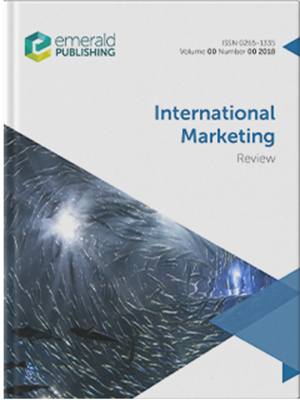A vicarious learning perspective on the relationship between home-peer performance and export intensity among SMEs
IF 4.6
3区 管理学
Q1 BUSINESS
引用次数: 0
Abstract
PurposeHome-peer firms (i.e. firms from the same industry and country) noticeably influence the internationalization behavior of small-to-medium-sized enterprises (SMEs). Drawing from vicarious learning literature, the authors theorize how home-peer firms' success in export markets affects SMEs' export intensity into those markets.Design/methodology/approachThe authors test the hypotheses on a sample of 32,108 Canadian SME exporters. A Tobit model was used to examine the effect of home-peer performance and its interactions with firm age, export experience, and geographic and institutional distance on export entry intensity.FindingsThe authors find that SMEs are more likely to enter export markets with higher intensity if home-peer firms perform well in those markets. This home-peer influence is stronger when the SME lacks export experience, when the home-peer information is more recent, and when environmental uncertainty is high.Originality/valueThe study is among the first to show empirically that the performance of home-peers positively influences the export intensity of SMEs in international markets, suggesting that SMEs use this measure to inform their internationalization strategies.中小企业家庭同伴绩效与出口强度关系的替代学习视角
目的国内同行企业(即来自同一行业和国家的企业)显著影响中小企业的国际化行为。根据替代学习文献,作者推断了国内同行企业在出口市场上的成功如何影响中小企业对这些市场的出口强度。设计/方法/方法作者对32108家加拿大中小企业出口商的样本进行了假设检验。Tobit模型用于检验国内同行绩效及其与企业年龄、出口经验、地理和机构距离的相互作用对出口进入强度的影响。研究结果作者发现,如果国内同行企业在出口市场表现良好,中小企业更有可能以更高的强度进入出口市场。当中小企业缺乏出口经验、国内同行信息较新以及环境不确定性较高时,这种国内同行影响力更强。独创性/价值该研究是首批实证表明国内同行的表现对中小企业在国际市场上的出口强度产生积极影响的研究之一,表明中小企业利用这一衡量标准来为其国际化战略提供信息。
本文章由计算机程序翻译,如有差异,请以英文原文为准。
求助全文
约1分钟内获得全文
求助全文
来源期刊

International Marketing Review
BUSINESS-
CiteScore
8.70
自引率
12.00%
发文量
55
期刊介绍:
International Marketing Review (IMR) is a journal that has, as its core remit, the goal of publishing research that pushes back the boundaries of international marketing knowledge. IMR does this by publishing novel research ideas, and by publishing papers that add substance to, question the basic assumptions of, reframe, or otherwise shape what we think we know within in the international marketing field. IMR is pluralistic, publishing papers that are conceptual, quantitative-empirical, or qualitative-empirical. At IMR, we aim to be a journal that recognizes great papers and great research ideas, and works hard with authors to nurture those ideas through to publication. We aim to be a journal that is proactive in developing the research agenda in international marketing, by identifying critical research issues, and promoting research within those areas. Finally, IMR is a journal that is comfortable exploring, and that fosters the exploration of, the interfaces and overlaps between international marketing and other business disciplines. Where no interfaces or overlaps exist, IMR will be a journal that is ready to create them. IMR’s definition of international marketing is purposefully broad and includes, although is not restricted to: -International market entry decisions and relationships; -Export marketing and supply chain issues; -International retailing; -International channel management; -Consumer ethnocentrism, country and product image and origin effects; -Cultural considerations in international marketing; -International marketing strategy; -Aspects of international marketing management such as international branding, advertising and new product development.
 求助内容:
求助内容: 应助结果提醒方式:
应助结果提醒方式:


